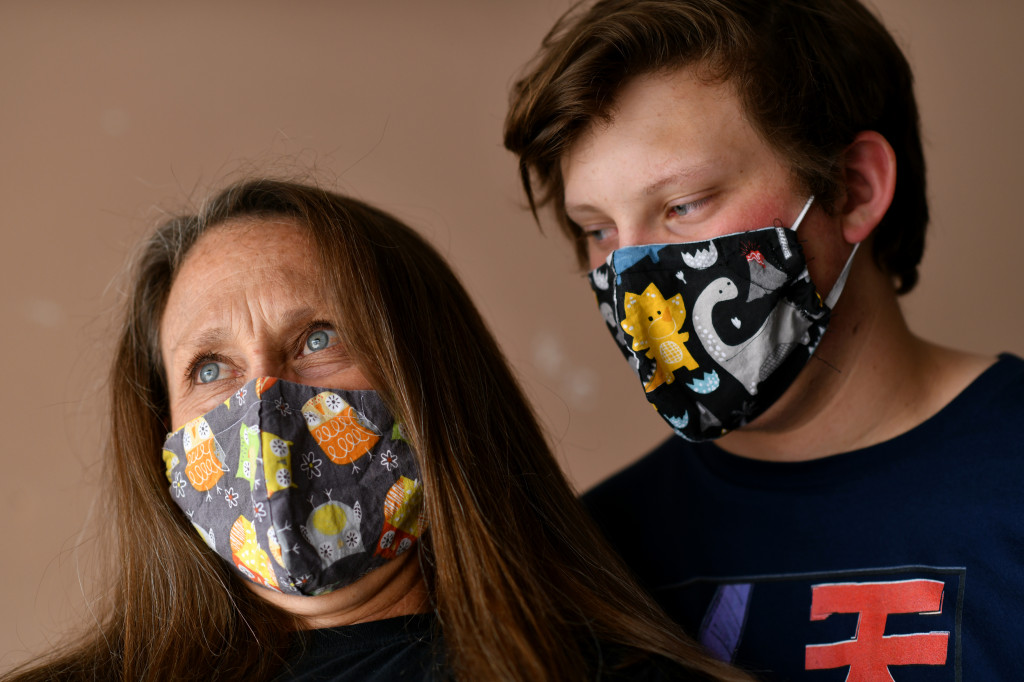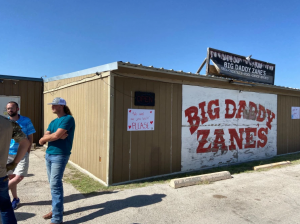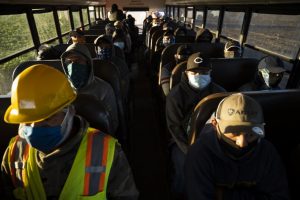Michelle Perkins has a story about her father that she often likes to share.
Dr. Joao doVale practiced family medicine in a rural community just outside of Waco, Texas. And, as compensation for the good doctor’s services, patients would occasionally offer livestock.
One time, when a bill came due, a cow was brought to the family home.
“And the cow ended up in his swimming pool,” Michelle laughed.
Such is the example that guided Perkins into medicine, sent her across the globe as a perinatal educator, and now has her combating the coronavirus pandemic as a bedside nurse at St. Anthony’s North in Westminster and Avista Adventist Hospital in Louisville.
“I always saw him taking care of the community growing up,” said Perkins, whose mother, Maryjo, was also a nurse. “He was a good doctor and a good guy and it made an impression on me.”
That impression, it seems, has trickled down the family tree to Perkins’ son, Hunter. As a part-time food service worker at Frasier Retirement Community in Boulder, the 18-year-old Fairview High School student delivers meals to seniors’ doorsteps every Sunday. Just like his mother, Hunter must strip down in a makeshift “hot zone” inside the garage of their Superior home whenever he returns from work.
“It’s weird to undress before I’m even in my room,” Hunter said, “and have to walk into the house in a towel and down the stairs.”
Weird is the new normal with COVID-19, when even the simple task of coming home must be done with deliberation for those on the front lines.
Michelle knows it better than most. The CU (bachelor’s) and Regis University (master’s) graduate has participated in medical mission work across the globe since 2011. A 56-year-old asthmatic, she’s gotten into the habit of taking precautions whenever she travels. This past year, that meant masking up and being diligent with her hygiene on trips to Asia and Africa.
“I know that viruses like this, an illness like this… it’s one plane ride away,” she said. “All it takes is that one person that’s infected to land here and start spreading it.”
Michelle estimates she leaves the country five times a year while serving as manager of “Helping Babies Breathe” — one of Centura Health’s Global Health Initiatives that teaches caregivers how to deal with the early dangers faced by newborns in remote settings. Her travels have included frequent trips to rural areas in Nepal, Tanzania, Uganda and Peru, where infant mortality remains a serious issue.
In the Loreto region of the Peruvian Amazon alone, where the program helped 1,700 health care providers receive training on resuscitation techniques over the past four years, the area’s infant mortality rate has been cut in half.
“The relationships I have made with health care providers in other countries, I have made some friends for life,” Michelle said. “Their challenges are just so immense and I think it’s truly impacted the way I practice medicine when I’m home. I don’t really take anything for granted.
“… We complain and protest — ‘we’ being the cumulative American society — about being on lockdown and being in social isolation and social distancing (during the pandemic), but they don’t have the luxury of doing that. A lot of them are living in a home that might only have two rooms and there might be eight, nine, 10 people living in a room.”
When the COVID outbreak first began in early March, Michelle’s husband, Eddie, rushed off to Palo Alto, Calif., to bring their 20-year-old daughter, Emma, back from Stanford.
Now Michelle finds herself confronting the virus while assisting mothers and their babies during labor. Pregnant women are believed to be at risk with COVID, given that their immune systems are compromised by their pregnancies. There’s also fear that if a mother contracts the virus and her baby isn’t infected, she will still be forced into isolation immediately after delivery — as has reportedly happened numerous times across the country.
“The level of anxiety is much higher, and the baseline level of anxiety in labor and delivery is always elevated because we’re dealing with two patients,” Michelle said. “We’re always kind of dealing with not only mom, but with baby.
“… People think of labor delivery as being kind of a safe place and kind of a low-risk area of the hospital, but we’re really very similar to our counterparts in the (emergency department). We don’t know who’s infected.”
Hence the need to take social distancing guidelines seriously in the Perkins household.
Even when Hunter ventures into the outdoors for an occasional hiking trip with his friends, he does so with a mask, always staying at least six feet apart and always with the virus in the back of his mind. He may miss out on senior prom or a traditional graduation ceremony with his Fairview classmates, but there’s a community to think about.
“It’s definitely passively on my mind, just every day, just to make sure that I’m being as safe as I can,” he said. “I’ve been super careful if I’m going to the grocery store or anything like that, just for (the seniors’) sake, because I don’t want to bring it to them.”



















